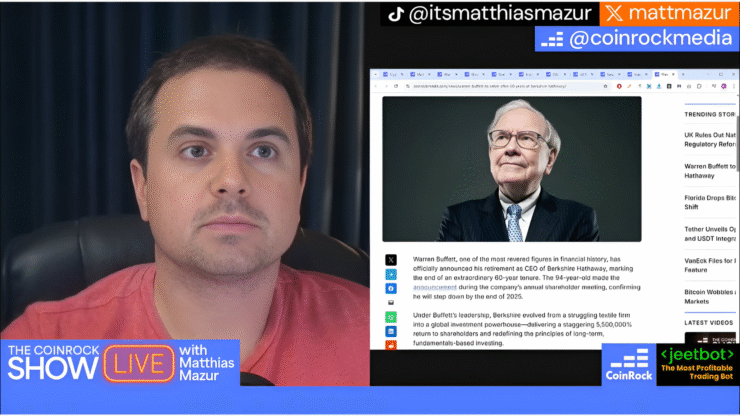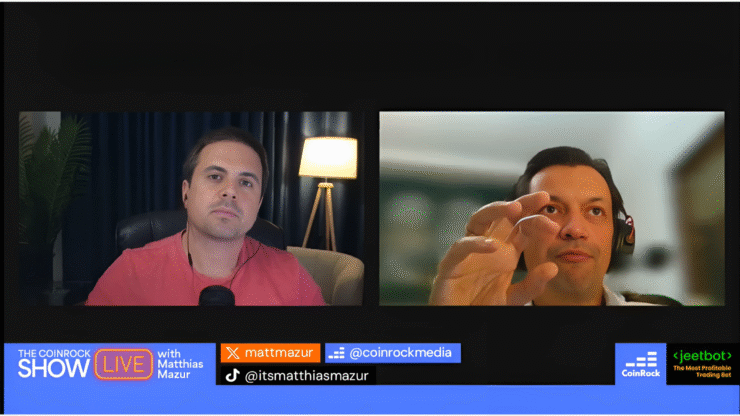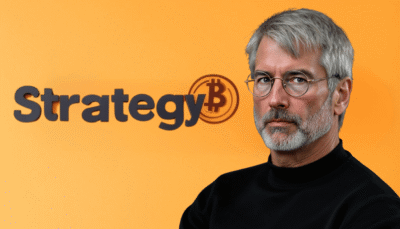This week’s episode of The CoinRock Show brought a high-voltage mix of market reflections and hard truths from the mining trenches, as host Matthias Mazur welcomed Denis Rusinovich — global mining strategist and founder of Cryptocurrency Mining Group (CMG). But before diving into Denis’ deep insights on Bitcoin’s collision course with energy infrastructure and geopolitics, Matthias opened the session with a sharp 30-minute solo segment recapping where the markets — and the mindset of the crypto industry — currently stand.
Matthias didn’t sugarcoat it.
“I’ve been saying this for months. There has been no bullish catalyst when it comes to price action since January,” he said, lamenting the sideways chop that’s defined crypto for months
We’re in May now. So yeah, I mean, again, I don’t want to be bearish. I’m not bearish, but I’m also a realist and there’s really nothing super exciting that’s been happening over the last few weeks and months.”
After a 10-day break from live streaming due to the Token2049 conference, Matthias shared a critical observation:
Token2049, despite being one of the top three crypto events globally, felt more B2B than buzz — a reflection, perhaps, of broader industry fatigue. No euphoria, just quiet deal-making among corporates and VCs.
He revisited the mantra he’s been repeating for weeks: until there’s clarity from the U.S. government on interest rates, tariffs, and economic policy, Bitcoin is a “small boat on a wild sea,” heavily reactive to macro headwinds.
“There will be a time where everything sends, but we’re not there yet. There’s a lot of things that need to change,” Matthias warned.
“Am I bullish mid to long term? Yes, of course. Super bullish. Otherwise, I wouldn’t be doing these shows.”
Matthias also used the intro to issue a powerful reminder to builders and investors alike: the real alpha isn’t in Discord or Telegram. “It’s when you meet people face to face,” he said. That’s how trust and business are built — and crypto is no different.

From sharing stories of bootstrapping his own business beginnings in 2007 to unpacking Warren Buffett’s retirement and investment philosophy, Matthias used the solo segment to blend hard market realities with timeless business wisdom.
“Buffett gets so much disrespect from the crypto crowd. It’s laughable. He’s one of the richest and wisest men in history,” Matthias argued.
The Miner Who Sees the World in Megawatts and Mandates
Soon enough, The Show shifted gears from macro gloom to deep mining insight, as Denis Rusinovich joined the broadcast. With two decades of experience spanning project finance at EBRD, metals & mining, and private equity before going all-in on Bitcoin mining in 2017, Denis brought a unique, global perspective few in crypto can match.
Host Matthias Mazur framed it perfectly:
‘We’ve had macro specialists, we’ve had trading specialists, we’ve had marketing experts… Today we have someone who is very deep into Bitcoin mining and also very involved when it comes to geopolitics.”
Denis kicked off with a measured but impactful origin story — tracing his path from conservative institutions like the European Bank for Reconstruction and Development (EBRD) to a megawatt-scale mining venture in Kazakhstan. Back then, Bitcoin was still viewed by most governments with extreme skepticism, if not outright hostility.
“I’ll be very honest,” Denis admitted.
“It took me time to be convinced it wasn’t some Ponzi scheme… because I’m like everyone else at the time was reading FT Economist”
But unlike crypto-native converts who entered through the Bitcoin whitepaper, Denis approached mining through the lens of infrastructure and commodities. That perspective was key. He recognized mining not as a wild crypto gamble, but as a CapEx-intensive industrial operation — no different in complexity from a traditional data center or energy asset.
Why Bitcoin Mining is More Than Just Hashrate
As the conversation deepened, Denis made a compelling case: Bitcoin mining isn’t just a digital hustle or a decentralized gamble — it’s an infrastructure business with geopolitical implications. He emphasized a two-pronged understanding of the sector. On one end, you have a continuous, high-consumption power client—essentially a 24/7 data center optimized for electricity. On the other, you’re trading a digital commodity that behaves much like metals in an OTC market.
“Bitcoin mining is the easiest and fastest moving client which you can ever get,” Denis explained.
“With Bitcoin mining, it’s much more simple. They can cut the corners on some optimization, but what’s vital and what is there is the telecom and the energy supply.”
This argument, he pointed out, was a crucial selling point in convincing governments — like Kazakhstan’s — to formalize the sector. By citing case studies in Sweden and referencing district heating systems in the Baltics, Denis showed how Bitcoin mining could recycle excess heat or leverage isolated energy grids to spur localized growth. With AI demand rising and energy becoming a central concern globally, miners are now increasingly treated like partners in national infrastructure strategy.

The Migration Effect and Energy Wars
Rusinovich turned his focus to the macro arena, offering sobering reflections on mining’s place in global power dynamics. The recurring theme? No country survives two halving cycles unscathed.
Whether it’s regulatory pressure, grid strain, or geopolitical shifts, miners constantly migrate. And that’s not necessarily bad — it decentralizes the hashpower and opens new opportunities in the global South. Yet Denis cautioned: when miners start competing with governments or citizens for energy, “that’s where the dead end begins.”
From China’s ban to Kazakhstan’s illegal smuggling fallout, and Ethiopia’s Chinese-financed hydro expansion, Denis laid out an evolving world map where energy, sovereignty, and Bitcoin intersect. Mining, he argued, can be either a strategic ally or a policy threat — depending on how it’s integrated.
If we look at the actual fundamentals, it is not about democracy, it’s about control of resources.”
“And this is where the interest of Russia, China, Europe, US, you know, is all trying to coexist and compete there.”
In places like Ethiopia, surplus hydro power and geopolitical tensions around the Nile basin create a unique dynamic: Bitcoin mining becomes a bootstrapping tool to build infrastructure quickly — even if it’s phased out later. The same applies in Russia, where remote nuclear power surplus near the Arctic circle could be tapped for localized industrial growth via mining.
Future State: From Industrial Clusters to Financial Products
To wrap up, Denis offered a glimpse of where mining is headed next. He sees increasing convergence with traditional industries like waste management, utilities, and even oil & gas. Off-grid setups, flare gas mining, and localized Bitcoin liquidity models are all on the rise. Institutional capital — with strict mandates and reporting templates — is also pushing miners to mature operationally.
“If you want to access capital, this is where you come to the traditional template, where you’re speaking to the funds or some institutional guys, I mean, they obviously will not adjust their pro forma template for you. They have a mandate and they will say, guys, you either tick the box or you don’t.”
As mining becomes more compliant and efficient, legacy hardware will find its way to the gray zones — low-cost, high-risk environments where ROI still works. Meanwhile, larger countries are likely to start demanding that Bitcoin generated on their soil is also monetized domestically. Russia and Kazakhstan already require local BTC selling, and Denis expects more countries to follow.
And with profitability still hovering around $40K/month for a 1MW container at $0.06/kWh, the incentives to scale remain strong — for now.
Bitcoin Mining is Becoming Nation-State Aware
Denis Rusinovich doesn’t romanticize Bitcoin mining. He demystifies it.
From power grids to policy papers, from Arctic megawatts to African hydro dams, Denis made one thing clear: Bitcoin mining isn’t just a footnote in crypto — it’s a frontline instrument in the global battle for infrastructure dominance.
“Because of the convergence with other sectors, segmentation within the sector will be much more fine-tuned going forward,” he said.
“You’re definitely going to have more professional players who actually do the sector convergence using the flare gas or basically using the oil and gas sector, energy utilities, for example, waste management is a massive opportunity where you have a by-product.”
As the next cycle looms, miners and policymakers alike would be wise to listen.
Where You Can Find Denis Rusinovich
Connect with Denis:
- X : @DenisRusinovich
- LinkedIn: Denis Rusinovich
- Clay Profile: Denis Rusinovich on Clay
- CMG Cryptocurrency Mining Group: @BTCMiningGroup




